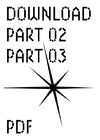User:Pedro Sá Couto/Graduate Research Seminar Trim 5/Chapter 02 08012020: Difference between revisions
(Created page with "<small>From the XPUB PAD<br> https://pad.xpub.nl/p/psc_chapter_02_03</small> <div style='max-width: 70%;'> =Chapter 02 Draft=") |
No edit summary |
||
| (11 intermediate revisions by the same user not shown) | |||
| Line 4: | Line 4: | ||
<div style='max-width: 70%;'> | <div style='max-width: 70%;'> | ||
= | =Part 03= | ||
Download pdf here↓ | |||
[[File:part0102logo.jpg|link=https://pzwiki.wdka.nl/mw-mediadesign/images/9/90/Thesis_Draft_21012020.pdf|100px|frameless|left]] | |||
<br><br><br><br><br><br><br><br><br> | |||
==Part 2: Sorting Imprints== | |||
<br> | |||
:'''Point A:''' Appropriation of techniques that were historically used to append imprints able to grant marks of quality and acknowledgement are now readjusted. | |||
:'''Argument 1 :''' Watermarking as an aesthetic enhancement, a mark of quality to a user imprint. | |||
::Watermarks in libraries and archives | |||
::Watermarks in the publishing business | |||
:'''Argument 2 :''' Library stamps providing a body of evidence for determining both the circumstance and date of acquisition, questioning on ownership and acquisition. | |||
::Library stamps in libraries and archives | |||
::Stamps in the publishing business | |||
:'''Research focus''' | |||
:Examine the repercussion of publishing businesses creating body of evidence against downloaders and how it is opposed to the idea of libraries as a place to access knowledge and to create a community. | |||
:'''Summary''' | |||
:In this chapter, I will start by addressing how language and techniques from libraries and archives were appropriated by commercial distribution channels as a way to create accountability for users who illegally download, distribute and make available copyrighted material. This is done by leaving imprints like the user geolocation, IP addresses, mac addresses, email addresses, etc. Sharing copyrighted material is easy and one can even do it without knowing it. Publishers started to set strategies to limit access to illegal copies. Focused on watermarking in the realm of publishing I will explore what services create and append them. What traces can be left? What kind of information can we spot? Is there any impact on platform users that are constantly reminded that a book has DRM? | |||
Latest revision as of 15:41, 18 January 2020
From the XPUB PAD
https://pad.xpub.nl/p/psc_chapter_02_03
Part 03
Download pdf here↓
Part 2: Sorting Imprints
- Point A: Appropriation of techniques that were historically used to append imprints able to grant marks of quality and acknowledgement are now readjusted.
- Argument 1 : Watermarking as an aesthetic enhancement, a mark of quality to a user imprint.
- Watermarks in libraries and archives
- Watermarks in the publishing business
- Argument 2 : Library stamps providing a body of evidence for determining both the circumstance and date of acquisition, questioning on ownership and acquisition.
- Library stamps in libraries and archives
- Stamps in the publishing business
- Research focus
- Examine the repercussion of publishing businesses creating body of evidence against downloaders and how it is opposed to the idea of libraries as a place to access knowledge and to create a community.
- Summary
- In this chapter, I will start by addressing how language and techniques from libraries and archives were appropriated by commercial distribution channels as a way to create accountability for users who illegally download, distribute and make available copyrighted material. This is done by leaving imprints like the user geolocation, IP addresses, mac addresses, email addresses, etc. Sharing copyrighted material is easy and one can even do it without knowing it. Publishers started to set strategies to limit access to illegal copies. Focused on watermarking in the realm of publishing I will explore what services create and append them. What traces can be left? What kind of information can we spot? Is there any impact on platform users that are constantly reminded that a book has DRM?

